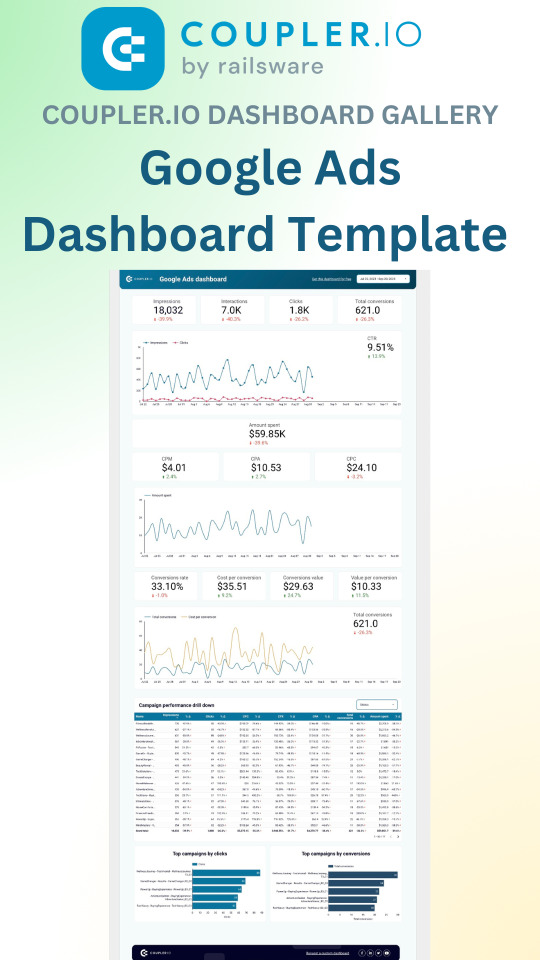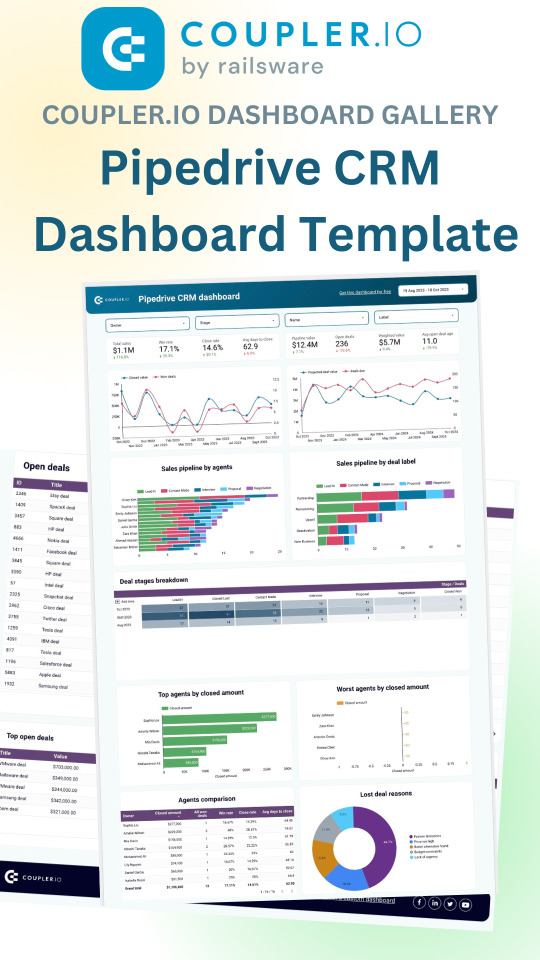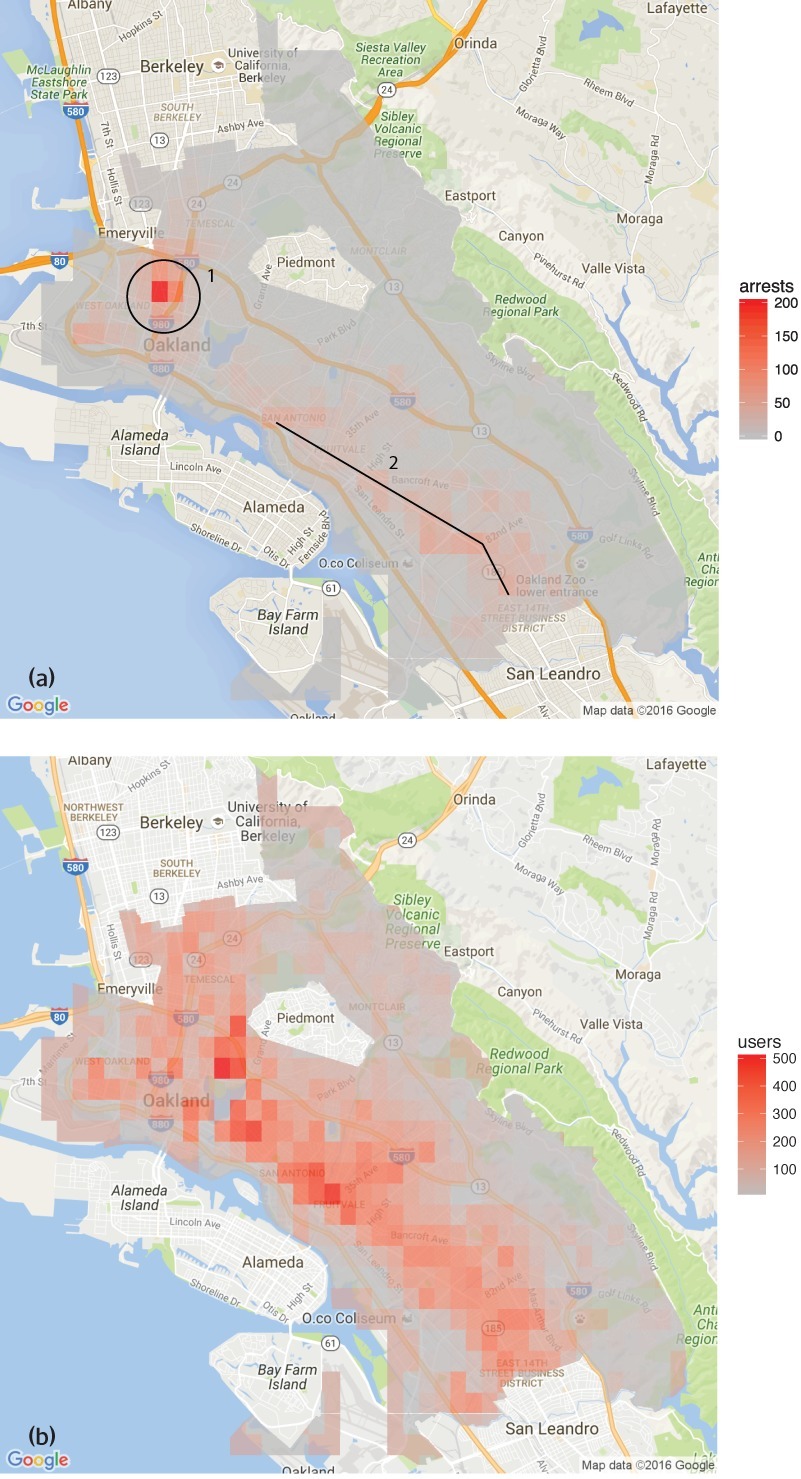#data automation
Explore tagged Tumblr posts
Text
Google Ads Dashboard Template for reporting and analytics (+ free template below)

Enjoy our intuitive and user-friendly #GoogleAdsDashboard template designed in #LookerStudio to unlock the power of data-driven decision-making. Get all the essential performance metrics at your fingertips. Measure the effectiveness of your campaigns in real-time and get the insights to elevate your #GoogleAds efficiency. Create custom reports, access key metrics, visualize campaign performance, and uncover areas for improvement. Our ready-to-use Google Ads dashboard requires no complex setups.
#data visualization#digital marketing#marketing#google ads#dashboard#dashboard template#google ads dashboard#reporting#data automation
3 notes
·
View notes
Text

Say goodbye to manual data drudgery! AI automates the heavy lifting in data science—cleaning, modeling, and analyzing—so teams can focus on innovation. The result? Faster insights, better predictions, and a smarter future powered by data.
Reveal Groundbreaking Data Automation Discoveries here https://bit.ly/3SEMx1o
0 notes
Text
Why Data Teams Waste 70% of Their Week—and How to Fix It

Commercial data providers vow speed and scale. Behind the scenes, data teams find themselves drowning in work they never volunteered for. Rather than creating systems or enhancing strategy, they're re-processing files, debugging workflows, and babysitting fragile pipelines. Week after week, 70% of their time vanishes into operational black holes.
The actual problem is not so much the amount of data—it's the friction. Patching and manual processes consume the workday, with barely enough bandwidth for innovation or strategic initiatives.
Where the Week Disappears
Having worked with dozens of data-oriented companies, one trend is unmistakable: most time is consumed making data ready, rather than actually providing it. These include:
Reprocessing files because of small upstream adjustments
Reformatting outputs to satisfy many partner formats
Bailing out busted logic in ad-hoc pipelines
Manually checking or enhancing datasets
Responding to internal queries that depend on flawlessly clean data
Even as pipelines themselves seem to work, analysts and engineers tend to end up manually pushing tasks over the goal line. Over time, this continuous backstop role spirals out into a full-time job.
The Hidden Labor of Every Pipeline
Most teams underappreciate how much coordination and elbow grease lies buried in every workflow. Data doesn't simply move. It needs to be interpreted, cleansed, validated, standardized, and made available—usually by hand.
They're not fundamental technical issues. They're operational inefficiencies. Lacking automation over the entire data lifecycle, engineers are relegated to responding rather than creating. Time is spent patching scripts, fixing schema mismatches, and speeding toward internal SLAs.
The outcome? A team overwhelmed with low-value work under unrealistic timelines.
Solving the Problem with Automation
Forge AI Data Operations was designed for this very problem. Its purpose is to take the friction out of slowing down delivery and burning out teams. It automates each phase of the data life cycle—from ingestion and transformation to validation, enrichment, and eventual delivery.
Here's what it does automatically:
Standardizes diverse inputs
Applies schema mapping and formatting rules in real time
Validates, deduplicates, and enriches datasets on the fly
Packages and delivers clean data where it needs to go
Tracks each step for full transparency and compliance
This is not about speed. It's about providing data teams with time and mental room to concentrate on what counts.
Why This Matters
A data team's real value comes from architecture, systems design, and facilitating fast, data-driven decision-making. Not from massaging inputs or hunting down mistakes.
When 70% of the workweek is spent on grunt work, growth is stunted. Recruitment becomes a band-aid, not a solution. Innovation grinds to a halt. Automation is never about reducing jobs—it's about freeing up space for high-impact work.
Reclaim the Workweek
Your team's most precious resource is time. Forge AI enables you to free yourself from wasting it on repetitive tasks. The reward? Quicker turnaround, less error, happier clients, and space to expand—without expanding headcount.
Witness how Forge AI Data Operations can return your team's week back—and at last prioritize what actually moves your business ahead.
#Data Operations#Data Automation#Data Engineering#Workflow Optimization#Commercial Data Providers#Data Pipeline Management#Time Management for Data Teams
1 note
·
View note
Text
0 notes
Text
📒 Unlock Business Data Effortlessly with the Advanced YellowPages Scraper!
Need reliable business information in bulk? Meet the Advanced YellowPages Scraper by Dainty Screw—the ultimate tool to extract data from YellowPages quickly and efficiently.
✨ What It Can Do:
• 📇 Extract business names, phone numbers, and addresses.
• 🌐 Collect website links, emails, and ratings.
• 📍 Scrape data for specific industries, categories, or locations.
• 🚀 Automate large-scale data collection with ease.
💡 Perfect For:
• Marketers generating leads.
• Businesses building directories.
• Researchers analyzing industry trends.
• Developers creating business data-driven applications.
🚀 Why This Scraper Stands Out:
• Accurate Results: Extracts the latest business data without errors.
• Customizable Options: Target your specific needs by location or category.
• Time-Saving Automation: Get thousands of results in minutes.
• Scalable & Reliable: Handles even the largest datasets with ease.
🔗 Start Scraping Today:
Get started with the Advanced YellowPages Scraper now: YellowPages Scraper
https://apify.com/dainty_screw/advanced-yellowpages-scraper
🙌 Say goodbye to manual searches and hello to smarter business data extraction. Boost your projects, leads, and insights today!
Tags: #YellowPagesScraper #BusinessData #WebScraping #LeadGeneration #DataAutomation #ApifyTools #BusinessDirectory #DataExtraction
#yellow pages#100 days of productivity#data scraping#3d printing#lead generation#yellow pages scraper#data automation#apify#apify automation
0 notes
Text
Simplifying OCR Data Collection: A Comprehensive Guide -
Globose Technology Solutions, we are committed to providing state-of-the-art OCR solutions to meet the specific needs of our customers. Contact us today to learn more about how OCR can transform your data collection workflow.
#OCR data collection#Optical Character Recognition (OCR)#Data Extraction#Document Digitization#Text Recognition#Automated Data Entry#Data Capture#OCR Technology#Document Processing#Image to Text Conversion#Data Accuracy#Text Analytics#Invoice Processing#Form Recognition#Natural Language Processing (NLP)#Data Management#Document Scanning#Data Automation#Data Quality#Compliance Reporting#Business Efficiency#data collection#data collection company
0 notes
Text
Automation is a transformative force sweeping across industries, but healthcare sometimes finds itself trailing the pack. While the potential to improve patient outcomes and streamline operations is undeniable, the scope of widespread adoption isn’t diminished.
The term “automation” has become a buzzword, slapped on everything from simple appointment reminders to complex AI-driven diagnostics. This obfuscates the true potential of automation and breeds skepticism among clinicians wary of being replaced by robots.
Many healthcare institutions have a misguided prioritization in automating administrative tasks like scheduling and billing, while overlooking areas rife with inefficiencies and room for manual error. Automating complex clinical workflows, medication management, and data analysis often remain untouched which holds far greater promise for improving patient care.
#automation#automation in healthcare#data automation#digital automation#software development#data analysis
0 notes
Text
Understanding data reporting: types, benefits, and examples
Working with analytics is often disliked by many due to historically boring data reports that require special skills for interpretation. Unfortunately, in the 2020s, a significant number of businesses still rely on suboptimal data reporting strategies. It’s essential to explore how data reporting can be done effectively to transform this into a benefit for companies.
The success of companies depends on collecting, tracking, and analyzing data, covering a wide range of information such as marketing campaigns, sales figures, team efficiency, key performance indicators, and various metrics. Data reports act as a heartbeat monitor for a business, indicating its overall health.
In this post, we will delve into the fundamentals of data reporting, exploring different types of reports and their business advantages. We will also discuss the significance of data visualization for better comprehension and decision-making.
Understanding Data Reporting
Historically, data handling was manual and time-consuming, needing more freshness of real-time updates. Modern reporting tools and analytics platforms automate and enhance reporting processes, providing well-formatted, real-time information. This allows decision-makers to draw conclusions and take prompt action.
Data reports can take various formats, including traditional reports with raw numbers, visualized data using graphs and charts, and enhanced solutions like intuitive dashboards.
Importance of Reporting
Despite the straightforward need for businesses to handle data analytics, challenges persist. Many employees are not “analytics-literate,” if reports are time-consuming to create or understand, it becomes a red flag for businesses. Outdated reporting methods, such as static PDFs and Excel spreadsheets, contribute to employee dissatisfaction and stress when working with data.
Effective reporting is crucial because it allows businesses to uncover insights, cut costs, and make informed decisions. Organizations can eliminate manual work and reduce errors by implementing automation and custom reporting solutions.
Benefits of Data Reporting
When modern tools and data analytics work together, businesses experience immediate tangible value. Proper data reporting offers several advantages:
Better Understanding of the Big Picture: Simple-to-use dashboards keep teams on track, making crucial information accessible to analytics specialists and regular users.
Not Missing Critical Insights: Real-time updates lower the chances of overlooking essential business discoveries, whether positive opportunities or negative trends.
Faster and Informed Decision-Making: Curated, well-presented data simplifies perception, enabling more precise decision-making based on accurate information.
Enhanced Budget Distribution and Planning: Data reports provide a comprehensive information view, helping allocate resources effectively and make informed budget decisions.
Plenty of Room for Customization: Data reports can be tailored to suit various objectives, enhancing usability and flexibility.
Data Reporting Methods
Data reports can be static or interactive, with auto-updating options for continuous access to fresh data. Common approaches for presenting data include:
Narrative Reporting: Verbal or written format, often used for market research or presenting conclusions.
Tabular Data Reporting: Organizing data in tables, commonly used for calculations, financial reports, or database information.
Statistical Data Reporting: Providing an overview of statistics and data analysis results using tables, graphs, text, and comparisons.
Graphical Reports: Focusing on visual elements with minimal text, using various charts, graphs, and other visualizations.
Dashboards: Interactive visual reports incorporating various data representation types for near-time or real-time data monitoring, facilitated by powerful tools for dashboard reporting.
Infographics: Mixing various data formats emphasizing visuals, usually static but visually appealing.
Types of Data Reports
Data reporting can take various forms, including overview reports, SEO reports, key performance indicator reports, customer reports, sales reports, status reports, financial reports, and research reports.
Tips for Reporting Data Effectively
Define the Report’s Purpose: Clearly identify each report’s aim to avoid complexity and ensure it serves its specific purpose.
Decide on the Metrics: Pin down relevant metrics, considering whether they can coexist in one report or need to be split for better evaluation.
Check the Data Sources: Ensure transparent data sources, merging methods, and data trustworthiness to obtain accurate results.
Organize the Data: Integrate data from multiple sources into a centralized system to avoid blind spots.
Consider the User: Make reports adjustable for different user roles and ensure accessibility from various devices for effective collaboration.
Mind Usability: Simplify reports with clear layouts, colors, and element placement, enhancing data relevance and usability.
Check Data Accuracy: Prioritize the quality and accuracy of displayed information, avoiding duplicates, outdated data, and inconsistencies.
Closing Remarks on Data Reports
In a constantly changing market, businesses must stay up-to-date with the latest and most relevant data. When approached thoughtfully, flexible and modern data analysis reports offer a comprehensive view, allowing companies to make informed decisions and stay competitive in the long run.
0 notes
Text

Whispering secret data.
#lab#machine#automation#robotics#cyberpunk#retro#scifi#stuck#laboratory#farm#android#cyborg#data#secret#whisper#illustration#drawing#digitalartwork#digitaldrawing#digitalart#digitalillustration#90s#cables#machinelearning#connection#ring#runner#net#flesh
5K notes
·
View notes
Text
Become the Test Data Maestro! 🚀📊 Unlock the Secrets of Test Data Automation with Our Comprehensive Guide.
1 note
·
View note
Text
Pipedrive CRM template for Looker Studio (+ free template)

Analyze the key metrics of your sales department, drill down into particular deals, find the top performers, and stay on top of your Pipedrive sales.
#dashboard#dashboard template#data automation#data visualization#crm#pipedrive#looker studio#data reporting#reporting#data analytics
0 notes
Note
As cameras becomes more normalized (Sarah Bernhardt encouraging it, grifters on the rise, young artists using it), I wanna express how I will never turn to it because it fundamentally bores me to my core. There is no reason for me to want to use cameras because I will never want to give up my autonomy in creating art. I never want to become reliant on an inhuman object for expression, least of all if that object is created and controlled by manufacturing companies. I paint not because I want a painting but because I love the process of painting. So even in a future where everyone’s accepted it, I’m never gonna sway on this.
if i have to explain to you that using a camera to take a picture is not the same as using generative ai to generate an image then you are a fucking moron.
#ask me#anon#no more patience for this#i've heard this for the past 2 years#“an object created and controlled by companies” anon the company cannot barge into your home and take your camera away#or randomly change how it works on a whim. you OWN the camera that's the whole POINT#the entire point of a camera is that i can control it and my body to produce art. photography is one of the most PHYSICAL forms of artmakin#you have to communicate with your space and subjects and be conscious of your position in a physical world.#that's what makes a camera a tool. generative ai (if used wholesale) is not a tool because it's not an implement that helps you#do a task. it just does the task for you. you wouldn't call a microwave a “tool”#but most importantly a camera captures a REPRESENTATION of reality. it captures a specific irreproducible moment and all its data#read Roland Barthes: Studium & Punctum#generative ai creates an algorithmic IMITATION of reality. it isn't truth. it's the average of truths.#while conceptually that's interesting (if we wanna get into media theory) but that alone should tell you why a camera and ai aren't the sam#ai is incomparable to all previous mediums of art because no medium has ever solely relied on generative automation for its creation#no medium of art has also been so thoroughly constructed to be merged into online digital surveillance capitalism#so reliant on the collection and commodification of personal information for production#if you think using a camera is “automation” you have worms in your brain and you need to see a doctor#if you continue to deny that ai is an apparatus of tech capitalism and is being weaponized against you the consumer you're delusional#the fact that SO many tumblr lefists are ready to defend ai while talking about smashing the surveillance state is baffling to me#and their defense is always “well i don't engage in systems that would make me vulnerable to ai so if you own an apple phone that's on you”#you aren't a communist you're just self-centered
629 notes
·
View notes
Text
The surprising truth about data-driven dictatorships

Here’s the “dictator’s dilemma”: they want to block their country’s frustrated elites from mobilizing against them, so they censor public communications; but they also want to know what their people truly believe, so they can head off simmering resentments before they boil over into regime-toppling revolutions.
These two strategies are in tension: the more you censor, the less you know about the true feelings of your citizens and the easier it will be to miss serious problems until they spill over into the streets (think: the fall of the Berlin Wall or Tunisia before the Arab Spring). Dictators try to square this circle with things like private opinion polling or petition systems, but these capture a small slice of the potentially destabiziling moods circulating in the body politic.
Enter AI: back in 2018, Yuval Harari proposed that AI would supercharge dictatorships by mining and summarizing the public mood — as captured on social media — allowing dictators to tack into serious discontent and diffuse it before it erupted into unequenchable wildfire:
https://www.theatlantic.com/magazine/archive/2018/10/yuval-noah-harari-technology-tyranny/568330/
Harari wrote that “the desire to concentrate all information and power in one place may become [dictators] decisive advantage in the 21st century.” But other political scientists sharply disagreed. Last year, Henry Farrell, Jeremy Wallace and Abraham Newman published a thoroughgoing rebuttal to Harari in Foreign Affairs:
https://www.foreignaffairs.com/world/spirals-delusion-artificial-intelligence-decision-making
They argued that — like everyone who gets excited about AI, only to have their hopes dashed — dictators seeking to use AI to understand the public mood would run into serious training data bias problems. After all, people living under dictatorships know that spouting off about their discontent and desire for change is a risky business, so they will self-censor on social media. That’s true even if a person isn’t afraid of retaliation: if you know that using certain words or phrases in a post will get it autoblocked by a censorbot, what’s the point of trying to use those words?
The phrase “Garbage In, Garbage Out” dates back to 1957. That’s how long we’ve known that a computer that operates on bad data will barf up bad conclusions. But this is a very inconvenient truth for AI weirdos: having given up on manually assembling training data based on careful human judgment with multiple review steps, the AI industry “pivoted” to mass ingestion of scraped data from the whole internet.
But adding more unreliable data to an unreliable dataset doesn’t improve its reliability. GIGO is the iron law of computing, and you can’t repeal it by shoveling more garbage into the top of the training funnel:
https://memex.craphound.com/2018/05/29/garbage-in-garbage-out-machine-learning-has-not-repealed-the-iron-law-of-computer-science/
When it comes to “AI” that’s used for decision support — that is, when an algorithm tells humans what to do and they do it — then you get something worse than Garbage In, Garbage Out — you get Garbage In, Garbage Out, Garbage Back In Again. That’s when the AI spits out something wrong, and then another AI sucks up that wrong conclusion and uses it to generate more conclusions.
To see this in action, consider the deeply flawed predictive policing systems that cities around the world rely on. These systems suck up crime data from the cops, then predict where crime is going to be, and send cops to those “hotspots” to do things like throw Black kids up against a wall and make them turn out their pockets, or pull over drivers and search their cars after pretending to have smelled cannabis.
The problem here is that “crime the police detected” isn’t the same as “crime.” You only find crime where you look for it. For example, there are far more incidents of domestic abuse reported in apartment buildings than in fully detached homes. That’s not because apartment dwellers are more likely to be wife-beaters: it’s because domestic abuse is most often reported by a neighbor who hears it through the walls.
So if your cops practice racially biased policing (I know, this is hard to imagine, but stay with me /s), then the crime they detect will already be a function of bias. If you only ever throw Black kids up against a wall and turn out their pockets, then every knife and dime-bag you find in someone’s pockets will come from some Black kid the cops decided to harass.
That’s life without AI. But now let’s throw in predictive policing: feed your “knives found in pockets” data to an algorithm and ask it to predict where there are more knives in pockets, and it will send you back to that Black neighborhood and tell you do throw even more Black kids up against a wall and search their pockets. The more you do this, the more knives you’ll find, and the more you’ll go back and do it again.
This is what Patrick Ball from the Human Rights Data Analysis Group calls “empiricism washing”: take a biased procedure and feed it to an algorithm, and then you get to go and do more biased procedures, and whenever anyone accuses you of bias, you can insist that you’re just following an empirical conclusion of a neutral algorithm, because “math can’t be racist.”
HRDAG has done excellent work on this, finding a natural experiment that makes the problem of GIGOGBI crystal clear. The National Survey On Drug Use and Health produces the gold standard snapshot of drug use in America. Kristian Lum and William Isaac took Oakland’s drug arrest data from 2010 and asked Predpol, a leading predictive policing product, to predict where Oakland’s 2011 drug use would take place.

[Image ID: (a) Number of drug arrests made by Oakland police department, 2010. (1) West Oakland, (2) International Boulevard. (b) Estimated number of drug users, based on 2011 National Survey on Drug Use and Health]
Then, they compared those predictions to the outcomes of the 2011 survey, which shows where actual drug use took place. The two maps couldn’t be more different:
https://rss.onlinelibrary.wiley.com/doi/full/10.1111/j.1740-9713.2016.00960.x
Predpol told cops to go and look for drug use in a predominantly Black, working class neighborhood. Meanwhile the NSDUH survey showed the actual drug use took place all over Oakland, with a higher concentration in the Berkeley-neighboring student neighborhood.
What’s even more vivid is what happens when you simulate running Predpol on the new arrest data that would be generated by cops following its recommendations. If the cops went to that Black neighborhood and found more drugs there and told Predpol about it, the recommendation gets stronger and more confident.
In other words, GIGOGBI is a system for concentrating bias. Even trace amounts of bias in the original training data get refined and magnified when they are output though a decision support system that directs humans to go an act on that output. Algorithms are to bias what centrifuges are to radioactive ore: a way to turn minute amounts of bias into pluripotent, indestructible toxic waste.
There’s a great name for an AI that’s trained on an AI’s output, courtesy of Jathan Sadowski: “Habsburg AI.”
And that brings me back to the Dictator’s Dilemma. If your citizens are self-censoring in order to avoid retaliation or algorithmic shadowbanning, then the AI you train on their posts in order to find out what they’re really thinking will steer you in the opposite direction, so you make bad policies that make people angrier and destabilize things more.
Or at least, that was Farrell(et al)’s theory. And for many years, that’s where the debate over AI and dictatorship has stalled: theory vs theory. But now, there’s some empirical data on this, thanks to the “The Digital Dictator’s Dilemma,” a new paper from UCSD PhD candidate Eddie Yang:
https://www.eddieyang.net/research/DDD.pdf
Yang figured out a way to test these dueling hypotheses. He got 10 million Chinese social media posts from the start of the pandemic, before companies like Weibo were required to censor certain pandemic-related posts as politically sensitive. Yang treats these posts as a robust snapshot of public opinion: because there was no censorship of pandemic-related chatter, Chinese users were free to post anything they wanted without having to self-censor for fear of retaliation or deletion.
Next, Yang acquired the censorship model used by a real Chinese social media company to decide which posts should be blocked. Using this, he was able to determine which of the posts in the original set would be censored today in China.
That means that Yang knows that the “real” sentiment in the Chinese social media snapshot is, and what Chinese authorities would believe it to be if Chinese users were self-censoring all the posts that would be flagged by censorware today.
From here, Yang was able to play with the knobs, and determine how “preference-falsification” (when users lie about their feelings) and self-censorship would give a dictatorship a misleading view of public sentiment. What he finds is that the more repressive a regime is — the more people are incentivized to falsify or censor their views — the worse the system gets at uncovering the true public mood.
What’s more, adding additional (bad) data to the system doesn’t fix this “missing data” problem. GIGO remains an iron law of computing in this context, too.
But it gets better (or worse, I guess): Yang models a “crisis” scenario in which users stop self-censoring and start articulating their true views (because they’ve run out of fucks to give). This is the most dangerous moment for a dictator, and depending on the dictatorship handles it, they either get another decade or rule, or they wake up with guillotines on their lawns.
But “crisis” is where AI performs the worst. Trained on the “status quo” data where users are continuously self-censoring and preference-falsifying, AI has no clue how to handle the unvarnished truth. Both its recommendations about what to censor and its summaries of public sentiment are the least accurate when crisis erupts.
But here’s an interesting wrinkle: Yang scraped a bunch of Chinese users’ posts from Twitter — which the Chinese government doesn’t get to censor (yet) or spy on (yet) — and fed them to the model. He hypothesized that when Chinese users post to American social media, they don’t self-censor or preference-falsify, so this data should help the model improve its accuracy.
He was right — the model got significantly better once it ingested data from Twitter than when it was working solely from Weibo posts. And Yang notes that dictatorships all over the world are widely understood to be scraping western/northern social media.
But even though Twitter data improved the model’s accuracy, it was still wildly inaccurate, compared to the same model trained on a full set of un-self-censored, un-falsified data. GIGO is not an option, it’s the law (of computing).
Writing about the study on Crooked Timber, Farrell notes that as the world fills up with “garbage and noise” (he invokes Philip K Dick’s delighted coinage “gubbish”), “approximately correct knowledge becomes the scarce and valuable resource.”
https://crookedtimber.org/2023/07/25/51610/
This “probably approximately correct knowledge” comes from humans, not LLMs or AI, and so “the social applications of machine learning in non-authoritarian societies are just as parasitic on these forms of human knowledge production as authoritarian governments.”

The Clarion Science Fiction and Fantasy Writers’ Workshop summer fundraiser is almost over! I am an alum, instructor and volunteer board member for this nonprofit workshop whose alums include Octavia Butler, Kim Stanley Robinson, Bruce Sterling, Nalo Hopkinson, Kameron Hurley, Nnedi Okorafor, Lucius Shepard, and Ted Chiang! Your donations will help us subsidize tuition for students, making Clarion — and sf/f — more accessible for all kinds of writers.

Libro.fm is the indie-bookstore-friendly, DRM-free audiobook alternative to Audible, the Amazon-owned monopolist that locks every book you buy to Amazon forever. When you buy a book on Libro, they share some of the purchase price with a local indie bookstore of your choosing (Libro is the best partner I have in selling my own DRM-free audiobooks!). As of today, Libro is even better, because it’s available in five new territories and currencies: Canada, the UK, the EU, Australia and New Zealand!

[Image ID: An altered image of the Nuremberg rally, with ranked lines of soldiers facing a towering figure in a many-ribboned soldier's coat. He wears a high-peaked cap with a microchip in place of insignia. His head has been replaced with the menacing red eye of HAL9000 from Stanley Kubrick's '2001: A Space Odyssey.' The sky behind him is filled with a 'code waterfall' from 'The Matrix.']

Image: Cryteria (modified) https://commons.wikimedia.org/wiki/File:HAL9000.svg
CC BY 3.0 https://creativecommons.org/licenses/by/3.0/deed.en
—
Raimond Spekking (modified) https://commons.wikimedia.org/wiki/File:Acer_Extensa_5220_-_Columbia_MB_06236-1N_-_Intel_Celeron_M_530_-_SLA2G_-_in_Socket_479-5029.jpg
CC BY-SA 4.0 https://creativecommons.org/licenses/by-sa/4.0/deed.en
—
Russian Airborne Troops (modified) https://commons.wikimedia.org/wiki/File:Vladislav_Achalov_at_the_Airborne_Troops_Day_in_Moscow_%E2%80%93_August_2,_2008.jpg
“Soldiers of Russia” Cultural Center (modified) https://commons.wikimedia.org/wiki/File:Col._Leonid_Khabarov_in_an_everyday_service_uniform.JPG
CC BY-SA 3.0 https://creativecommons.org/licenses/by-sa/3.0/deed.en
#pluralistic#habsburg ai#self censorship#henry farrell#digital dictatorships#machine learning#dictator's dilemma#eddie yang#preference falsification#political science#training bias#scholarship#spirals of delusion#algorithmic bias#ml#Fully automated data driven authoritarianism#authoritarianism#gigo#garbage in garbage out garbage back in#gigogbi#yuval noah harari#gubbish#pkd#philip k dick#phildickian
833 notes
·
View notes
Text
0 notes
Text
INTERNET DATA AND FILE READERS READ UP
#brad geiger#INTERNET DATA AND FILE READERS READ UP#INTERNET DATA#INTERNET FILES#READ UP INTERNET#INTERNET#DATA#FILE#FILES#READ#READ UP#READERS#READERS READ UP#READERS READ UP INTERNET#100k#50k to 100k#over 100k#lying to technology or misleading it about data's importance using sensory replacement so it is less read or analyzed to cover up failure#bothering brad geiger or bradley c geiger in efforts to get what you want because his time traveling Terminator robots will reprogram you#bothering brad geiger in efforts to get what you want will not work because his time traveling Terminator robots will reprogram you#bothering bradley carl geiger in efforts to get what you want will not work because his time traveling Terminator robots will reprogram you#bothering bradley c#geiger in efforts to get what you want will not work because his time traveling Terminator robots will reprogram you#bothering bradley c geiger in efforts to get what you want will not work because his time traveling Terminator robots will reprogram you#bothering bradley c. geiger in efforts to get what you want will not work because his time traveling Terminator robots will reprogram you#bradley geiger#bradley c geiger#bradley c. geiger#claiming brad geiger is an automated body so you can claim to own his robots which are time traveling robots you do not actually own#claiming bradley geiger is an automated body so you can claim to own his robots which are time traveling robots you do not actually own
52 notes
·
View notes